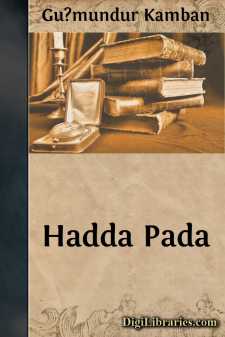Fiction
- Action & Adventure 183
- Biographical 15
- Christian 59
- Classics 6965
- Coming of Age 5
- Contemporary Women 3
- Erotica 8
- Espionage/Intrigue 12
- Fairy Tales, Folklore & Mythology 236
- Family Life 169
- Fantasy 117
- Gay 1
- General 596
- Ghost 32
- Historical 808
- Horror 43
- Humorous 161
- Jewish 25
- Legal 4
- Medical 22
- Mystery & Detective 315
- Occult 1
- Political 49
- Psychological 41
- Religious 64
- Romance 160
- Sagas 11
- Science Fiction 730
- Sea Stories 113
- Short Stories (single author) 538
- Sports 10
- Suspense 1
- Technological 8
- Thrillers 2
- Urban Life 31
- Visionary & Metaphysical 1
- War & Military 173
- Westerns 199
Fiction Books
Sort by:
by:
Gu?mundur Kamban
INTRODUCTION Iceland has always been famous for the quality of her literature, although nowadays but little of it comes to our shores. It is, therefore, an especial pleasure to introduce the author of "Hadda Padda." Godmundur Kamban, son of a merchant of an old and well known Icelandic family, was born near Reykjavik, the capital of Iceland, on June 8, 1888. He was graduated twenty-two years...
more...
"1923." [The following is the description by Professor J. Scott, F.R.S., of his recent Airship Journey across the old Bed of the North Sea. July 1, 1923.] It is perhaps unnecessary for me to state the objects and purpose of my journey of last week, as it would be false modesty in me not to recognise the great interest taken by the geologic and antiquarian worlds in my proposed enterprise. For...
more...
by:
Edwin Lefevre
I The trouble was not in being a bank clerk, but in being a clerk in a bank that wanted him to be nothing but a bank clerk. That kind always enriches first the bank and later on a bit of soil. Hendrik Rutgers had no desire to enrich either bank or soil. He was blue-eyed, brown-haired, clear-skinned, rosy-cheeked, tall, well-built, and square-chinned. He always was in fine physical trim, which made...
more...
CHAPTER I. THE STERILE PROSPECT AND THE LONELY TRAVELLER. Our scene lies in the upper part of the state of Georgia, a region at this time fruitful of dispute, as being within the Cherokee territories. The route to which we now address our attention, lies at nearly equal distances between the main trunk of the Chatahoochie and that branch of it which bears the name of the Chestatee, after a once...
more...
by:
Walter Scott
A man may see how this world goes with no eyes. Look with thine ears. See how yon justice rails upon yon simple thief. Hark in thine ear: Change places; and, handy-dandy, which is the justice, which is the thief? —King Lear. Among those who took the most lively interest in endeavouring to discover the person by whom young Charles Hazlewood had been waylaid and wounded was Gilbert Glossin, Esquire,...
more...
by:
Walter Scott
INTRODUCTION The Novel or Romance of Waverley made its way to the public slowly, of course, at first, but afterwards with such accumulating popularity as to encourage the Author to a second attempt. He looked about for a name and a subject; and the manner in which the novels were composed cannot be better illustrated than by reciting the simple narrative on which Guy Mannering was originally founded;...
more...
"Neque imbellem ferocesProgenerant aquilæ columbam."It is not a pleasant epoch in one's life, the first forty-eight hours at a large public school. I have known strong-minded men of mature age confess that they never thought of it without a shiver. I don't count the home-sickness, which perhaps only affects seriously the most innocent of débutants, but there are other thousand and...
more...
PROLOGUE. It was November in London. The great city was buried under a dank, yellow fog. Traffic was temporarily checked; foot passengers groped their way by the light of the street lamps, and the hoarse shouts of the link boys running before cabs and carriages with blazing torches rang at intervals above the muffled rumble of countless wheels. In the coffee-room of a quiet hotel on the Strand a young...
more...
CHAPTER I THE STOLEN MOTOR "You are aware, I suppose, Marshall, that there have been considerably over a million dollars' worth of automobiles stolen in this city during the past few months?" asked Guy Garrick one night when I had dropped into his office. "I wasn't aware of the exact extent of the thefts, though of course I knew of their existence," I replied. "What's...
more...
by:
Thomas Lathbury
CHAPTER I. A SKETCH OF PAPAL ATTEMPTS IN ENGLAND AND IRELAND DURING THE REIGN OF ELIZABETH. THE STATE OF RELIGION AND THE COUNTRY ON JAMES’S ACCESSION. As an introduction to the subject, of which this volume professes more especially to treat, I purpose to give a sketch of the proceedings of the emissaries of Rome in this country, during the long reign of Queen Elizabeth. Queen Mary died 1558, when...
more...











